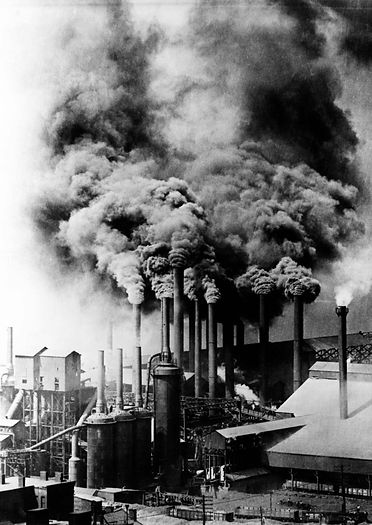THE INDUSTRIAL REVOLUTION
THE ENTREPRENEURS
The Industrial Revolution created some of the most successful innovators in history. From the start of the revolution, many became entrepreneurs, taking risks such as investing and buying other inventions to manufacture in order to make a profit. If their products took off, these men could simply sit back and be showered in profits as employees are forced to work. In the end, these entrepreneurs would be some of the most successful and influenceable people in their period.


Effect:
The coming of the new entrepreneurs saw the innovations of many new (and sometimes failed) contraptions and systems. Some of these inventions inspired other inventors and other inventions provided the missing piece for other contraptions. These new contraptions needed places to be manufactured or used so the many entrepreneurs began building factories.
One of the more negative effects that occurred with the industrial revolution was the large amounts of pollution. Many large factories were densely built in the main cities of Europe, causing the cities to become dark, clouded and stuffy areas. Pollution affected people’s health and caused more deaths alongside the already many unemployed and homeless starving people.
These new factories also took up a lot of space, causing lots of loss of housing, creating the world’s first slums. Though many were unemployed and starving, many worked the long and hard hours in the factories, only causing companies to expand further, building more factories and polluting the world more.

Cause:
Many entrepreneurs were simple businessmen or aristocrats before the industrial revolution. When the industrial revolution boomed, many saw the opportunity to make lots of money. Many invested in new factories, buildings and machines. As well as this, many took advantage of the fact that there were no laws, rules or regulations concerning employee wages and safety. This fact was usually the reason most men became entrepreneurs, as they could make huge profits with surprisingly small investments.
Other entrepreneurs created/mass produced someone’s new/bought machines, systems or new ways to complete tasks and saw how they were able to help the world. These men started their own companies, such as John D Rockefeller, who saw that the new mechanised society that was forming needed to be powered by some kind of fuel source. He found oil had the highest energy yield at the lowest extraction cost and his profits were multiplied enormously when brought to the scale of mass production.
Long Term Effect:
Though the many inventions had a lot of short term effects, such as providing new services and ways to do something, as well as inspiring inventors to create more innovative products, they also paved the foundations to their modern models. The battery powers our everyday devices, oil fuels our cars and the railways move our people and cargo. All the inventions that have survived the test of time until now have allowed the world to become more connected and more efficient. Looking at an ordinary room today, many pieces inside there would most likely originate from the creative mind of someone from the industrial revolution.
One of the most influential and leading entrepreneurs during the Industrial Revolution, Richard Arkwright, invented the modern factory system used even to this day. This allowed factories to run more efficiently and neatly, not only with the workforce but also with the finances and equipment.
The entrepreneurs connected the entire world together with each machine they built.